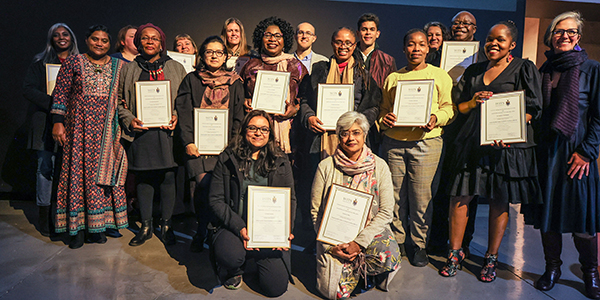Academic staff honoured for completing transitioning programme
- Wits University
Twenty Wits academics have completed the Enhancing Mid-Career Academic Transitions (EMCAT) pilot programme launched in 2022.
The Carnegie-funded programme was a collaboration between the Centre for Learning, Teaching and Development, the Research Office and the Transformation and Employment Equity Office.

A valedictory event was held at the end of the 18-month course to celebrate academic staff who successfully completed their transition programme.
Mid-career academics go through multiple and complex transitions. While these transitions are acknowledged as common markers of academic life, they journeyed in isolation with competing priorities on time. EMCAT facilitates developing one’s own style of leadership in teaching, research and academic citizenship.
The programme also helps each academic write and refine their academic portfolio supported by a writing retreat specifically dedicated to it. The dialogue, conversation and networking opportunities through Communities of Practice and small group mentorship sessions further enhance critical agency.
"It is really fantastic that we've had this kind of uptake and that you're all still with us at the end of it," said Professor Garth Stevens, the Deputy Vice-Chancellor for People Development and Culture at Wits.
"One of the key things about learning institutions is that you don't only facilitate the capacity for staff to be resilient in the face of adversity, you have to facilitate the opportunity for staff to thrive in an enabling environment."
Professor Stevens reiterated the importance of supporting staff in their personal academic journey and congratulated the successful EMCAT candidates on completing their transition.
The valedictory event also saw all the participants take to the podium in groups to reflect on their 18-month journey. Each group was asked to creatively present their reflections. Some made use of visual aids, whilst others used haikus and poetry.
"These haikus really represent what we've been through from the moment this programme started right to its end. We were challenged to be more forthcoming and intentional about our transition," said Shalini Dukhan, senior lecturer at the School of Animal, Plant and Environmental Studies.
Another group dubbed ‘the three musketeers’, sporting mouse ears at the tops of their heads, explained that they were like blind mice at the beginning of their programme.
"We later became agile, resourceful and fluid, enabling us to do more with our new talents acquired from the programme," said Jenika Gobind, senior lecturer at Wits Business School.

Dr Bernadette Johnson, Director of the Transformation and Employment Equity Office, thanked all those who successfully completed the pilot programme.
"We intentionally called the programme a transition. Academics don’t need to be ‘developed’ all the time as if something is missing. And as the programme developed, we knew we could institutionalise this. So going forward, there is an intention to build on that transition into leadership," she said.
The next round of EMCAT will also be supported by the Carnegie Corporation New York, and is likely to start in early 2024.
